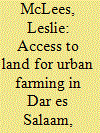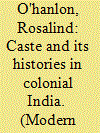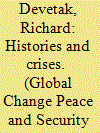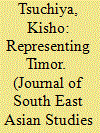| Srl | Item |
| 1 |
ID:
108611


|
|
|
|
|
| Publication |
2011.
|
| Summary/Abstract |
People in sub-Saharan Africa rely on a variety of informal mechanisms to gain access to land for urban farming. However, the literature on land tenure focuses on gaining access to land for housing, whereas farming, which is highly visible in the urban landscape of Dar es Salaam, Tanzania, requires farmers to negotiate their access in ways distinct from housing. A close examination of four open-space farms in Dar es Salaam reveals that there are different methods of gaining access to land for farming as opposed to housing. Additionally, theorising this access reveals that the landowners who allow farmers on their land for food production also derive benefits. This can provide a framework for current efforts to integrate urban agriculture into the city zoning plans.
|
|
|
|
|
|
|
|
|
|
|
|
|
|
|
|
| 2 |
ID:
152622


|
|
|
|
|
| Summary/Abstract |
David Washbrook's influential early work on South India set the terms for much subsequent debate about caste, with its exploration of the key role of the colonial state in shaping caste ideologies and institutions. Over subsequent decades, historians and anthropologists have come increasingly to emphasise the ‘colonial construction’ of caste and its enduring legacies in post-colonial India. Yet there were also significant continuities linking the forms of colonial caste with much earlier regional histories of conflict and debate, whose legacies can be traced into the late colonial period. In particular, the juxtaposition between Brahman and non-Brahman itself was anticipated in a tradition of conservative social commentary that emerged in the Deccan Sultanate state of Ahmadnagar, and came to circulate widely through Banaras and western India during the seventeenth and eighteenth centuries. This tradition of commentary acquired new salience during the nineteenth century. It entered the colonial archive as an authoritative source of knowledge, and also provoked early ‘non-Brahman’ intellectuals into a fresh engagement with its conservative social vision. In their attempts to rebut this vision, these intellectuals displayed a detailed knowledge of its social history and a deep familiarity with the judicial decisions through which it had been upheld in earlier centuries.
|
|
|
|
|
|
|
|
|
|
|
|
|
|
|
|
| 3 |
ID:
109863


|
|
|
| 4 |
ID:
168575


|
|
|
|
|
| Summary/Abstract |
This article provides an outline of the historical construction of Timorese (East Timorese and Indonesian West Timorese) geo-bodies and communal identities from the mid-nineteenth century to the present time, thereby reconstructing the origins of many national imaginings amongst the Timorese people. Since the controversial annexation of Portuguese Timor by Indonesia in 1976, (East) Timor has been constructed as a place of two territorial identities: Timor as a part of Indonesia and East Timor as a homogeneous nation distinct from Indonesia. However, representations of Timor had been much more fluid and inconsistent in preceding ages. This article studies various communities’ representations of Timor to reveal dialectic relations between diverse colonial and post-colonial representations of the Timorese spaces and their senses of belonging. Thereby, it problematises the political role of global and regional place-making in a contested Southeast Asian locale.
|
|
|
|
|
|
|
|
|
|
|
|
|
|
|
|